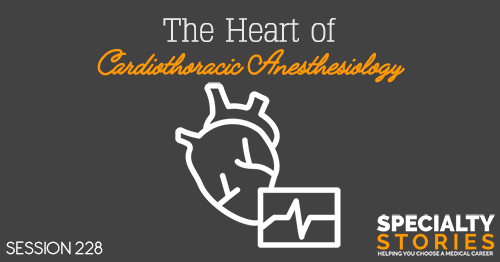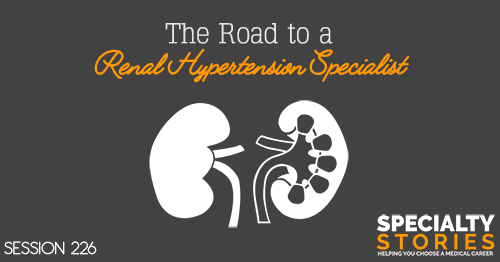Apple Podcasts | Google Podcasts

Session 02
In this episode, I talk with Dr. Freess, a community-based emergency medicine (EM) physician. Dr. Freess shares with us why he likes emergency medicine and how you can become a competitive applicant in EM.
He also talks about the benefits of being an EM doctor and why he would still choose to become an EM doctor if he had to do it all again.
Listen to this podcast episode with the player above, or keep reading for the highlights and takeaway points.
His path to Emergency Medicine:
- Initially wanting to go into primary care, specifically pediatrics
- Realizing after shadowing that he wanted to go into emergency medicine
Why he chose Emergency Medicine:
- Fast-paced atmosphere
- Down-to-earth people
- Variety (every day is completely different)
- Meeting people and learning about them
Can introverts be good EM physicians?
- Yes, although it’s more common to be extroverted in EM.
- Introverted EM docs could create a different kind of bond with the patients.
Working in a community hospital vs. academic hospital:
- There is a teaching aspect in the academic setting, but there are also more patients, more processes, residents, etc.
- In a community setting, you can fine-tune things, and it allows you to have more time for each patient.
- Find what’s best for you.
A typical day for Dr. Reess as an EM physician:
- Flexibility in shifts:
- Morning shifts begin at 7am
- Afternoon shifts start at 5 pm
- Overnight shifts start at 10 or 11 pm
- Sign into the computer and check which patient to see next.
- There is no predictable day.
- As you move up the leadership ladder, you get to pick better shifts.
What is it like to be a physician who’s a shift worker?
- There are set time periods where you’re scheduled to be there.
- There is no call for the most part once you’re off the clock.
The lifestyle of an emergency medicine physician:
- You can experience health detriments when you have to change your shift around between day and night. But there are ways you can work around it so it works for you.
- There are ways to avoid burnout.
- You can diversify your career, especially when you get older and it gets tougher to switch shifts.
- You can do part time, administration, free clinic, etc.
Traits that lead to being a good EM doctor:
- Flexibility
- Making a quick connection with patients
- Being okay with not having long-term connections with patients
What does a competitive applicant for EM look like?
- Well-rounded in medical training and medical interest
- Accepting of change
- Up for a challenge
- Someone with different life experiences since that will help you make connections with people
Why is emergency medicine competitive to match into?
- Desire for shift work and working fewer hours than other specialties
- Having good work-life balance and a good lifestyle
[Related episode: Looking at Emergency Medicine Match Data and Surveys.]
What residency was like for Dr. Reess:
- Strong work-life balance and family-oriented lifestyle
- Doing rotations in every specialty to get a sense of how they operate and get the basic knowledge
What he wished he knew going into EM:
- The majority of your day is dealing with “not exciting” things.
- 95% of your patients are the routine stuff and 5% of your patients are the exciting stuff.
What he wished primary care providers knew about EM:
- EM doctors are there to stabilize emergencies.
What he wished hospitalists knew about EM doctors:
- What resources EM doctors have
Unique opportunities outside of clinical care for EM physicians:
- Hospital administration
- Chief Information Officer / Chief Medical Officer
- Pharmaceuticals
- Consulting
- Community Medical Board
What he likes most about being an EM physician:
- His everyday job and work-life balance
- “Stop and go” lifestyle
What he likes least about being an EM doctor:
- Shift work on nights and weekends
- Inconvenient times and unpredictable schedule
The future of Emergency Medicine:
- More observation-based medicine
- More community help
- A generalized health system where they become the “brokers” of healthcare and the center of medical care
Some pieces of advice for those interested in EM:
Try it out, and try it in different settings. Find diverse rotations and trauma centers. Do a community medicine rotation abroad. Find diverse experiences, and understand what EM is outside of the major trauma centers.
Emergency medicine can look very different in different places. So get experience in many settings to know what you prefer.Click To TweetLinks and Other Resources
- Check out my Premed Playbook series of books (available on Amazon), with installments on the personal statement, the medical school interview, and the MCAT.
- Related episode: What Does Academic Emergency Medicine Look Like?
- Related episode: Do Surgical or EM Residencies Like Older Applicants?
- Need MCAT Prep? Save on tutoring, classes, and full-length practice tests by using promo code “MSHQ” at Blueprint MCAT (formerly Next Step Test Prep)!
SEARCH SITE
LISTEN FOR FREE











